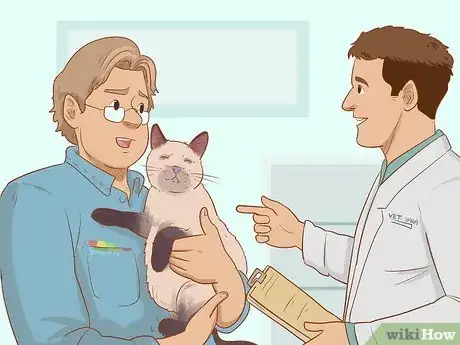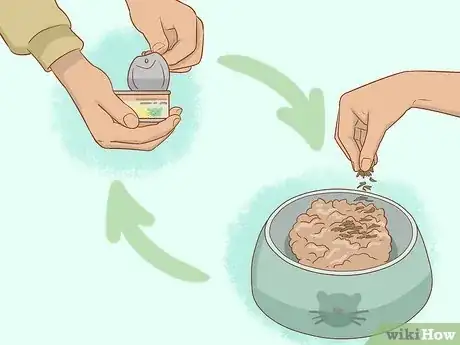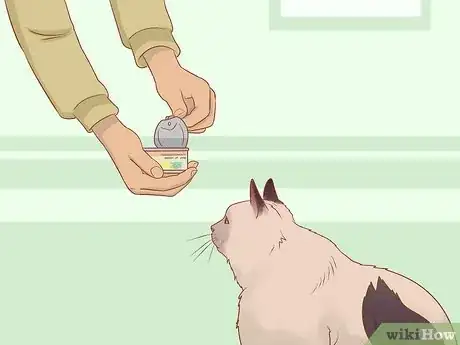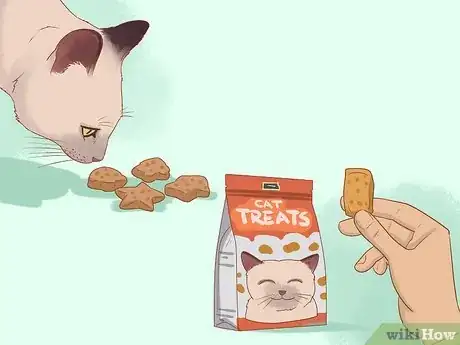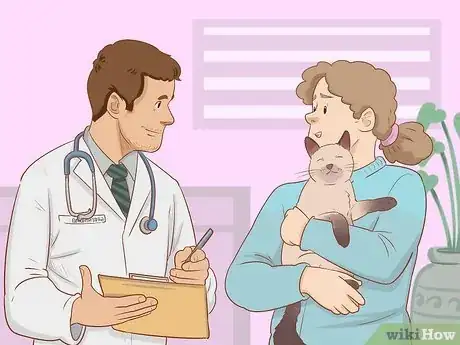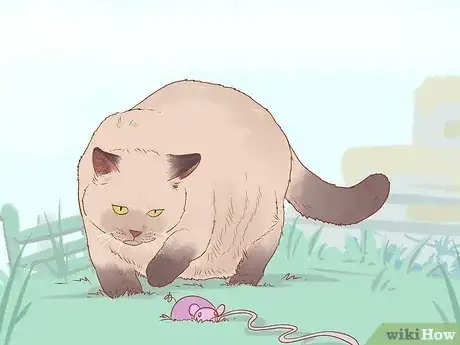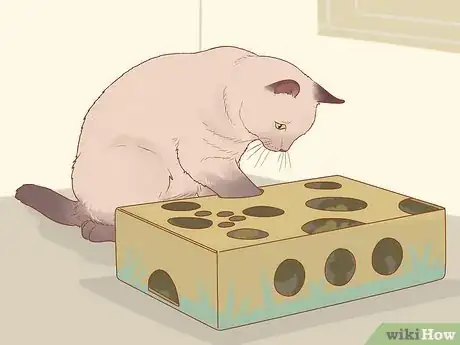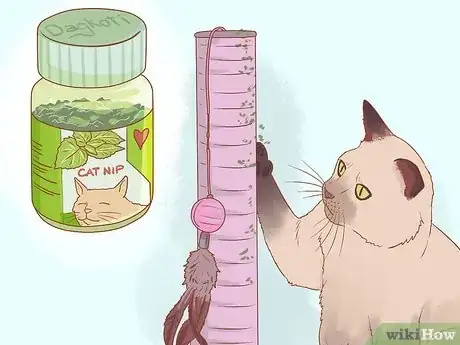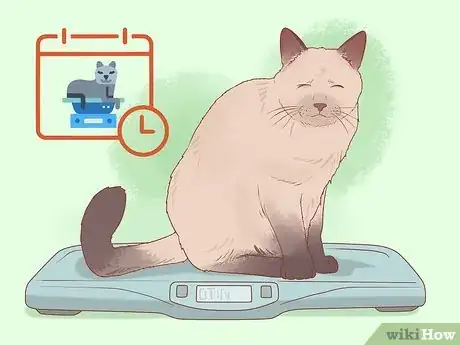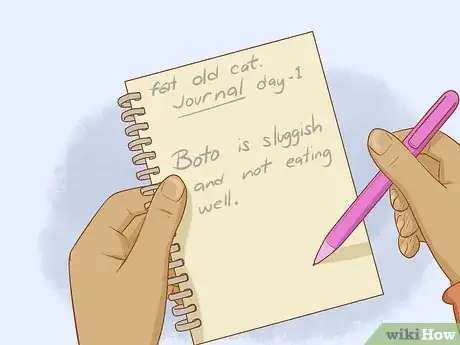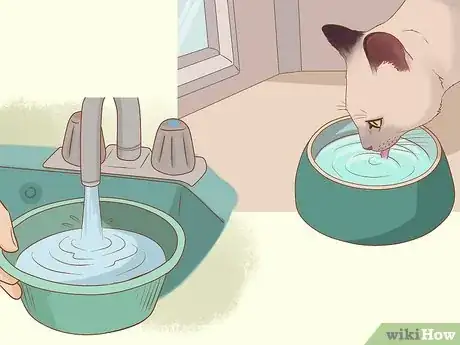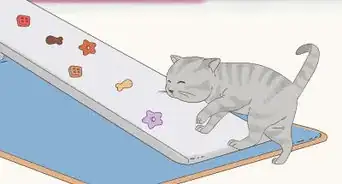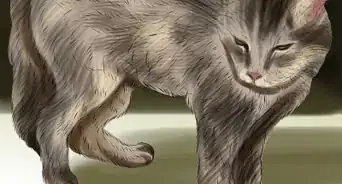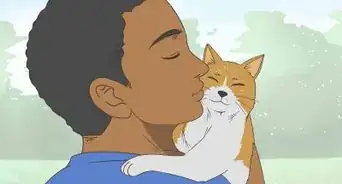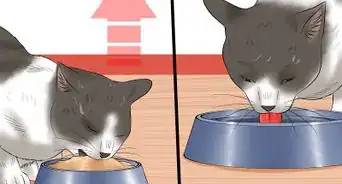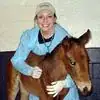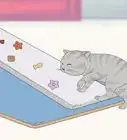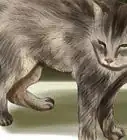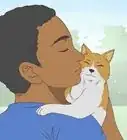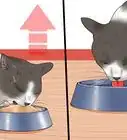This article was co-authored by Ryan Corrigan, LVT, VTS-EVN. Ryan Corrigan is a Licensed Veterinary Technician in California. She received her Bachelor of Science in Veterinary Technology from Purdue University in 2010. She is also a Member of the Academy of Equine Veterinary Nursing Technicians since 2011.
There are 10 references cited in this article, which can be found at the bottom of the page.
This article has been viewed 19,307 times.
To help your senior cat lose weight, consult your vet for advice and make changes such as switching from dry to canned food, only feeding it at set mealtimes, and cutting back on treats. Increase your cat’s activity level with hunting games and puzzle toys, making sure that the exercise isn’t too rigorous. Monitor your cat’s weight, water intake, and overall health to ensure its well-being.
Steps
Altering Your Cat's Diet
-
1Get your vet’s advice. If you are concerned that your senior cat is heading towards obesity, speak to your veterinarian before altering its diet. Your vet can assess how much weight your cat may need to lose or if the cat's weight will cause a problem. Weight gain (as well as other warning signs of obesity, such as loss of energy and difficulty breathing) are common with aging cats, but a vet should rule out other possible causes. Diseases that may cause weight gain in cats include:[1]
- Hypothyroidism
- Insulinoma (a tumor in the pancreas)
- Hypothalamic abnormalities
- Problems with the pituitary gland (which regulates hormone production)
-
2Reinforce set meal times. To encourage weight loss in your senior cat, reinforce distinct mealtimes to prevent overeating. Leaving food out for your cat to eat whenever it wishes will make it more difficult to monitor how much it is eating, and when. Place your cat’s food in its bowl and leave it out for about twenty minutes, then remove it until the next mealtime.[2]
- Your cat should be eating no more than one cup of dry cat food per day, or 6 oz. of canned food.[3]
- If your cat prefers to graze on their food over the day, ease them into a schedule. Start by offering 3-4 meals a day. In a week or 2, reduce this down to 2-3 meals and then eventually down to 2 meals a day.
Advertisement -
3Replace dry food with canned food. To help your senior cat lose weight, replace its dry cat food with canned food. Canned food generally has more protein (which should form the bulk of your cat’s diet) and fewer carbohydrates than dry food, so it is more conducive to weight loss. Dry food also contains more additives and preservatives, which are unhealthy and should be avoided as much as possible.[4]
- Canned food also has a higher moisture content, which is beneficial for senior cats who are prone to dehydration.
- Opt for organic canned food, which will have healthy, natural ingredients and no preservatives.
- The first 3 ingredients on the ingredient's list should include sources of protein, like meat or fish. If the first 3 ingredients contain additives, such as BHA or BHT, choose another brand.
- If you're uncertain which food to buy, ask your vet for recommendations. They may know a good brand designed to help cats lose weight.
-
4Give your cat fewer treats. A cat’s diet be made up of less than 10% treats each day. Be especially mindful with your senior cat, keeping treats down to 2 or 3 per day and rewarding your cat with petting and praise instead. Make sure that all household members adhere to this rule, and keep track of the treats you give your cat in a journal or on a whiteboard that can be erased daily.[5]
Making Sure It Gets Exercise
-
1Get your vet’s approval. Before making an effort to increase your cat’s exercise routine, get approval from your veterinarian. Age related issues like arthritis, vision loss, or hearing loss might make play, chasing, or jumping dangerous for your cat. Follow your vet’s recommendations for your senior cat’s ideal activity level.
- Ask questions like, "I was hoping to increase my cat's activity level by having it chase toys several times a day. Is my cat in good enough physical shape for that kind of activity?"
-
2Inspire your cat’s hunting instincts. Regularly engaging your senior cat in moderate play and exercise is the best way to help it lose weight. Engage your cat by playing on its hunting instincts, dragging and tossing a string, fishing rod toy, or toy mouse for it to follow. You can also use a laser pointer to capture your senior cat’s attention and get it moving.[6]
- If your cat shows signs of fatigue or shortness of breath, stop the activity immediately and call your vet if the problem persists.
-
3Buy puzzle toys. Purchase puzzle toys, which you can fill with treats and leave for your cat to play with at its leisure, online or at your local pet store. Cats work to slowly extract their reward from the toy, which usually takes several hours and plenty of energy. Cats are not able to overindulge on treats because of how time-consuming it is to get them out of the toy.
- At the beginning, you may need to show your cat how to use the puzzle toy. Demonstrate how to get the treat out to encourage your cat to use the toy.
-
4Use catnip to make play more appealing. To encourage your cat to play, buy refillable toys and fill them with dried catnip, available at pet stores. Use approximately 1 tsp.(0.5 oz.) of the harmless herb, which should be enough to elicit a "high" that will stimulate your cat's energy and enthusiasm. You can also make a catnip spray to apply directly to toys, or spray in your cat's play area.[7]
Monitoring Changes
-
1Weigh your cat regularly. To get an accurate picture of your cat’s health, weigh it every month. For a rough estimate of what your cat weighs, weigh yourself on a regular scale, then weigh yourself holding your cat, and subtract the difference. For a more accurate reading, purchase a digital scale for weighing babies.[8]
- Healthy domestic cats should generally weigh about 10 pounds, although this may vary by breed.[9]
-
2Keep a journal of health observations. Keep track of changes in your senior cat’s health so that you can accurately relay information to your vet during regular visits. Note small changes in weight, appetite, energy, and elimination, which may help your vet diagnose diseases or suggest improvements to your cat’s lifestyle. If you observe any alarming changes, such as your cat refusing to eat, contact the veterinarian immediately.[10]
- For instance, you might note that your cat is sluggish and not finishing its food, particularly if it lasts several days.
-
3Monitor your cat’s water intake. To help your senior cat lose weight, make sure that it drinks plenty of water on a daily basis. Older cats are prone to dehydration, which can lead to constipation, lethargy, and other energy-draining ailments. To entice your cat to drink, place several water bowls in different areas of your home, or purchase a water dispensing fountain at your local pet store.[11]
References
- ↑ http://www.peteducation.com/article.cfm?c=1+1398&aid=687
- ↑ http://pets.webmd.com/cats/guide/healthy-weight-for-your-cat
- ↑ http://www.catster.com/cat-food/how-much-should-i-feed-my-cat
- ↑ http://pets.webmd.com/cats/guide/healthy-weight-for-your-cat
- ↑ http://pets.webmd.com/cats/guide/cat-treats-and-snacks-whats-healthy
- ↑ https://www.petfinder.com/cats/cat-care/senior-cat/
- ↑ http://www.catbehaviorassociates.com/helpful-facts-about-catnip/
- ↑ http://consciouscat.net/2015/05/11/why-you-should-weigh-your-cat-regularly/
- ↑ http://pets.webmd.com/cats/guide/healthy-weight-for-your-cat
About This Article
To get an overweight senior cat to lose weight, try replacing its dry food with canned wet food since it has fewer carbohydrates. Also, instead of leaving food out all day for your cat, establish set meal times twice a day, which will make it easier to monitor how much it's eating. You should also limit treats to 2-3 a day and encourage your cat to exercise by buying it interactive toys. If your senior cat doesn't seem interested in exercising, try sprinkling some catnip on its toys to make it feel more playful. To learn more from our Veterinary Technician co-author, like what types of toys help keep your cat active, keep reading the article!
